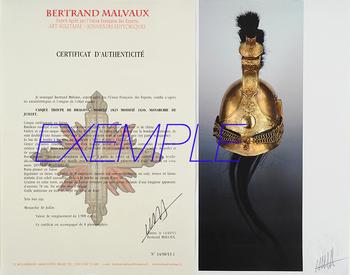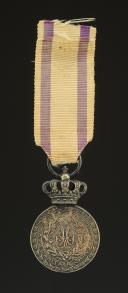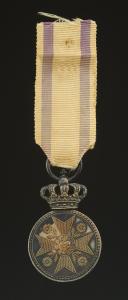
SPAIN: MEDAL OF THE ORDER OF CHARITY FOR THE CAMPAIGN OF 1872-1876, silver model, belonging to Louis Frédéric GOMBAUD DE SÉRÉVILLE, Third Republic. 21841-5
SPAIN: MEDAL OF THE ORDER OF CHARITY FOR THE CAMPAIGN OF 1872-1876, silver model, belonging to Louis Frédéric GOMBAUD DE SÉRÉVILLE, Third Republic. 21841-5
Silver round-shaped specimen, diameter 27.8 mm. Obverse decorated with the eight-pointed Maltese cross, each point angled with a daisy (in reference to the Queen), center depicting the Sacred Heart surrounded by the inscription "LA CARIDAD," outer border with a beaded molding. Reverse showing an oval medallion with the initial "M," surrounded by branches of lilies and daisies, with a ribbon bearing the Latin motto "QUIS NOS SE PARABIT CARITE CHRISTI," outer border featuring lily leaves. Surmounted by a royal crown, H 15 mm, width 17.6 mm, mounted on a hinge.
White silk ribbon with two purple stripes, width 24 mm.
Spain.
Second Empire.
Very good condition, slightly sun-faded ribbon.
HISTORY:
The Order of Charity was created by HM Don Carlos VII by royal decree on October 9, 1874, in honor of his wife, Reina Doña Margarita de Bourbon-Parme, known as the "Angel of charity" for her selflessness, sacrifice, and virtues throughout her life, particularly during the war. The order rewards military personnel wounded during the third Carlist War.
BIOGRAPHY:
Louis Frédéric GOMBAUD DE SÉRÉVILLE, born on November 1, 1822, in Moulins.
A student at the Saint Cyr military school from 1842 to 1844, GOMBAUD DE SÉRÉVILLE was appointed Second Lieutenant on October 1, 1844, in the 8th regiment of horse chasseurs. Two years later, he transferred to the 1st carabinier regiment and was promoted to Lieutenant on December 19, 1848, then to Captain on May 2, 1853.
On April 12, 1861, he was appointed Major of the 11th chasseur regiment and served in Algeria between 1861 and 1865. He was made a Knight of the Legion of Honor on August 13, 1863. On July 10, 1865, he was appointed Squadron Leader of the 1st Hussar regiment and served again in Algeria. The regiment was involved in the 1865 operations in the province of Oran, and on March 16, 1866, during the Battle of Ben Attab, he was wounded by a bullet in his right calf and a saber blow to the neck.
Promoted to Lieutenant Colonel on August 12, 1866, he was assigned to the 6th cuirassier regiment, then back to the 1st Hussar regiment on December 18, 1866, which he once again joined in Algeria. On December 22, 1868, he joined the Imperial Guard, in the regiment of the Empress's Dragoons.
Appointed Colonel on May 8, 1869, in the 5th chasseur regiment, he fought in the 1870 war. The regiment was engaged in Spicheren, and Gombaud was appointed an officer of the Legion of Honor on August 19, 1870. During the battle of Rezonville, his regiment distinguished itself by repelling the charge of Bredow's brigade, inflicting heavy losses. Gombaud was captured at the surrender of Metz and interned in Lubeck. Returning to France in April 1871, he resumed command of his regiment and participated in the suppression of the Lyon Commune.
Promoted to Brigadier General on October 14, 1875, he commanded cavalry brigades in Verdun, then Vendôme. He was appointed Commander of the Legion of Honor on January 18, 1881.
He died on July 30, 1892.
His son would also become a general.
CARLISM:
Carlism (in Spanish: carlismo) is a Spanish legitimist political movement that emerged in the 1830s, advocating for the throne for the senior branch of the Bourbon family of Spain. A conservative and anti-liberal movement, it instigated three civil wars that tore through 19th-century Spain and deeply marked the country.
Carlism originated when King Ferdinand VII (1784-1833) decided to pass the crown to his eldest daughter Isabelle, bypassing the Salic law established by Philip V in 1713 through the Pragmatic Sanction of 1830. Carlists rejected this change and deemed the alteration of the succession order without the consent of the Cortes as illegal. They advocated for the succession of the king's younger brother, Charles of Bourbon (1788-1855), following the reigning order of the previous century. Charles refused to swear allegiance to his niece and proclaimed himself "King of the Spains" as Charles V upon Ferdinand VII's death, supported by a faction of the Spanish people known as the "Carlists" (carlistas in Spanish), i.e., Charles's supporters.
Carlism was a traditionalist movement, committed to safeguarding the Catholic religion and upholding the fors (fueros), ancient local legal privileges. Initially, it supported the restoration of the Old Regime and opposed the more liberal and centralized political circles prevalent in the monarchs' surroundings.
Throughout the three resulting conflicts (1833-1840, 1846-1849, and 1872-1876), despite a few military victories, the Carlist forces failed to seize power in Madrid, which remained in the hands of Ferdinand VII's eldest daughter, Isabella II (from 1833 to 1868), then her son Alfonso XII (from 1874 to 1885), and finally the latter's son, Alfonso XIII (from 1886 to 1931).
As a movement with great longevity, Carlism exerted a fundamental influence on the country's political life from its inception until the end of Francoism in the 1970s and remained one of the main players in the monarchy and Church's struggles against liberalism and modernism throughout its existence. Several present-day movements still claim to be its heirs (such as the Carlist Party, Carlist Traditionalist Communion, Carlotaism, etc.), though their influence is extremely limited.
THIRD CARLIST WAR (1872-1876):
In 1869, pretender "Charles VII" published a manifesto outlining his ideas, including establishing traditional Cortes and enacting a Constitution or approving a Charter, as well as pursuing a protectionist economic policy. Among his entourage were right-wing politicians (derechistas), particularly called the "Catholics."
During this period, Isabella II had been dethroned for two years (1868), and after the regency of General Francisco Serrano, Parliament elected Amadeo of Savoy as king under the name Amadeo I of Spain.
Seeing the possibility of Bourbon restoration withering away, Charles VII initiated the Third Carlist War in 1872, first against Amadeo I, then against the Spanish First Republic proclaimed in 1873 after the king's abdication, and finally against Alfonso XII, proclaimed king by General Arsenio Martínez-Campos Antón in Sagonte (Valencia) at the end of 1874. The war concluded in 1876 with the capture of Estella (Navarre), the Carlist capital, and the pretender fleeing to France.
Silver round-shaped specimen, diameter 27.8 mm. Obverse decorated with the eight-pointed Maltese cross, each point angled with a daisy (in reference to the Queen), center depicting the Sacred Heart surrounded by the inscription "LA CARIDAD," outer border with a beaded molding. Reverse showing an oval medallion with the initial "M," surrounded by branches of lilies and daisies, with a ribbon bearing the Latin motto "QUIS NOS SE PARABIT CARITE CHRISTI," outer border featuring lily leaves. Surmounted by a royal crown, H 15 mm, width 17.6 mm, mounted on a hinge.
White silk ribbon with two purple stripes, width 24 mm.
Spain.
Second Empire.
Very good condition, slightly sun-faded ribbon.
HISTORY:
The Order of Charity was created by HM Don Carlos VII by royal decree on October 9, 1874, in honor of his wife, Reina Doña Margarita de Bourbon-Parme, known as the "Angel of charity" for her selflessness, sacrifice, and virtues throughout her life, particularly during the war. The order rewards military personnel wounded during the third Carlist War.
BIOGRAPHY:
Louis Frédéric GOMBAUD DE SÉRÉVILLE, born on November 1, 1822, in Moulins.
A student at the Saint Cyr military school from 1842 to 1844, GOMBAUD DE SÉRÉVILLE was appointed Second Lieutenant on October 1, 1844, in the 8th regiment of horse chasseurs. Two years later, he transferred to the 1st carabinier regiment and was promoted to Lieutenant on December 19, 1848, then to Captain on May 2, 1853.
On April 12, 1861, he was appointed Major of the 11th chasseur regiment and served in Algeria between 1861 and 1865. He was made a Knight of the Legion of Honor on August 13, 1863. On July 10, 1865, he was appointed Squadron Leader of the 1st Hussar regiment and served again in Algeria. The regiment was involved in the 1865 operations in the province of Oran, and on March 16, 1866, during the Battle of Ben Attab, he was wounded by a bullet in his right calf and a saber blow to the neck.
Promoted to Lieutenant Colonel on August 12, 1866, he was assigned to the 6th cuirassier regiment, then back to the 1st Hussar regiment on December 18, 1866, which he once again joined in Algeria. On December 22, 1868, he joined the Imperial Guard, in the regiment of the Empress's Dragoons.
Appointed Colonel on May 8, 1869, in the 5th chasseur regiment, he fought in the 1870 war. The regiment was engaged in Spicheren, and Gombaud was appointed an officer of the Legion of Honor on August 19, 1870. During the battle of Rezonville, his regiment distinguished itself by repelling the charge of Bredow's brigade, inflicting heavy losses. Gombaud was captured at the surrender of Metz and interned in Lubeck. Returning to France in April 1871, he resumed command of his regiment and participated in the suppression of the Lyon Commune.
Promoted to Brigadier General on October 14, 1875, he commanded cavalry brigades in Verdun, then Vendôme. He was appointed Commander of the Legion of Honor on January 18, 1881.
He died on July 30, 1892.
His son would also become a general.
CARLISM:
Carlism (in Spanish: carlismo) is a Spanish legitimist political movement that emerged in the 1830s, advocating for the throne for the senior branch of the Bourbon family of Spain. A conservative and anti-liberal movement, it instigated three civil wars that tore through 19th-century Spain and deeply marked the country.
Carlism originated when King Ferdinand VII (1784-1833) decided to pass the crown to his eldest daughter Isabelle, bypassing the Salic law established by Philip V in 1713 through the Pragmatic Sanction of 1830. Carlists rejected this change and deemed the alteration of the succession order without the consent of the Cortes as illegal. They advocated for the succession of the king's younger brother, Charles of Bourbon (1788-1855), following the reigning order of the previous century. Charles refused to swear allegiance to his niece and proclaimed himself "King of the Spains" as Charles V upon Ferdinand VII's death, supported by a faction of the Spanish people known as the "Carlists" (carlistas in Spanish), i.e., Charles's supporters.
Carlism was a traditionalist movement, committed to safeguarding the Catholic religion and upholding the fors (fueros), ancient local legal privileges. Initially, it supported the restoration of the Old Regime and opposed the more liberal and centralized political circles prevalent in the monarchs' surroundings.
Throughout the three resulting conflicts (1833-1840, 1846-1849, and 1872-1876), despite a few military victories, the Carlist forces failed to seize power in Madrid, which remained in the hands of Ferdinand VII's eldest daughter, Isabella II (from 1833 to 1868), then her son Alfonso XII (from 1874 to 1885), and finally the latter's son, Alfonso XIII (from 1886 to 1931).
As a movement with great longevity, Carlism exerted a fundamental influence on the country's political life from its inception until the end of Francoism in the 1970s and remained one of the main players in the monarchy and Church's struggles against liberalism and modernism throughout its existence. Several present-day movements still claim to be its heirs (such as the Carlist Party, Carlist Traditionalist Communion, Carlotaism, etc.), though their influence is extremely limited.
THIRD CARLIST WAR (1872-1876):
In 1869, pretender "Charles VII" published a manifesto outlining his ideas, including establishing traditional Cortes and enacting a Constitution or approving a Charter, as well as pursuing a protectionist economic policy. Among his entourage were right-wing politicians (derechistas), particularly called the "Catholics."
During this period, Isabella II had been dethroned for two years (1868), and after the regency of General Francisco Serrano, Parliament elected Amadeo of Savoy as king under the name Amadeo I of Spain.
Seeing the possibility of Bourbon restoration withering away, Charles VII initiated the Third Carlist War in 1872, first against Amadeo I, then against the Spanish First Republic proclaimed in 1873 after the king's abdication, and finally against Alfonso XII, proclaimed king by General Arsenio Martínez-Campos Antón in Sagonte (Valencia) at the end of 1874. The war concluded in 1876 with the capture of Estella (Navarre), the Carlist capital, and the pretender fleeing to France.
Price :
700,00 €
| Destination | Envoi recommandé | Envoi Recommandé + Express |
|---|---|---|
| Shipping France | 9,00 € | 30,00 € |
| Shipping Europe | 17,00 € | 50,00 € |
| Shipping world | 30,00 € | 70,00 € |
Insurance (1%) :
7,00 €
Reference :
21841-5

Next update Friday, January 16 at 13:30 PM
FOR ALL PURCHASES, PAYMENT IN MULTIPLE CHECKS POSSIBLE
bertrand.malvaux@wanadoo.fr 06 07 75 74 63
SHIPPING COSTS
Shipping costs are calculated only once per order for one or more items, all shipments are sent via registered mail, as this is the only way to have proof of dispatch and receipt.
For parcels whose value cannot be insured by the Post, shipments are entrusted to DHL or Fedex with real value insured, the service is of high quality but the cost is higher.
RETURN POLICY
Items can be returned within 8 days of receipt. They must be returned by registered mail at the sender's expense, in their original packaging, and in their original condition.
AUTHENTICITY
The selection of items offered on this site allows me to guarantee the authenticity of each piece described here, all items offered are guaranteed to be period and authentic, unless otherwise noted or restricted in the description.
An authenticity certificate of the item including the description published on the site, the period, the sale price, accompanied by one or more color photographs is automatically provided for any item priced over 130 euros. Below this price, each certificate is charged 5 euros.
Only items sold by me are subject to an authenticity certificate, I do not provide any expert reports for items sold by third parties (colleagues or collectors).
FOR ALL PURCHASES, PAYMENT IN MULTIPLE CHECKS POSSIBLE
bertrand.malvaux@wanadoo.fr 06 07 75 74 63
An authenticity certificate of the item including the description published on the site, the period, the sale price, accompanied by one or more color photographs is automatically provided for any item priced over 130 euros. Below this price, each certificate is charged 5 euros.
Only items sold by me are subject to an authenticity certificate, I do not provide any expert reports for items sold by third parties (colleagues or collectors).

